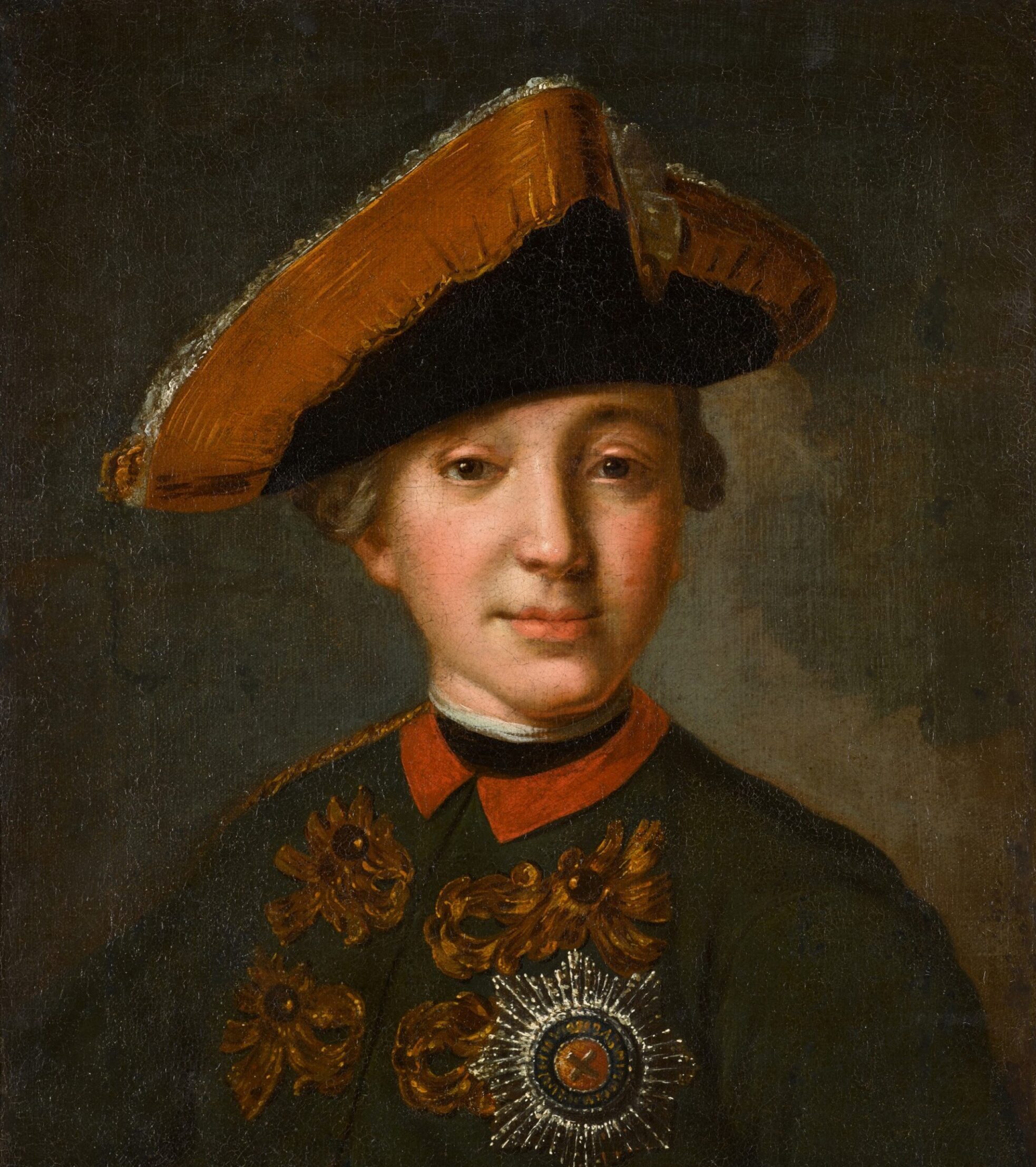BIOGRAPHY:

Peter the Third is the emperor of the Russian state, who ruled for about six months in the period from 1761 to 1762. The grandson of Peter the Great, a prominent statesman and reformer, the son of his own daughter Anna. Traditionally, researchers have assessed the period of Peter III’s political activity as a time of chaos in government, attributing all sorts of vices to the emperor. A more balanced position on the issue of his being the head of state appeared much later. According to it, Peter was the successor of the work of his famous ancestor. However, he never had time to show himself sufficiently, since he was overthrown as a result of a palace coup. The life of Peter III is tragic in many ways. He lost his parents early, fell into the hands of indifferent and cruel teachers, and was humiliated. Unprepared for government, he did not receive any acceptable education. He was a naive, simple-minded and inexperienced person in political matters.
EARLY YEARS:
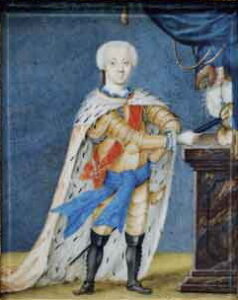
The future Russian Emperor Peter 3 was born on February 21, 1728 in the German city of Kiel. It was not the largest settlement. The young man’s parents were related by a dynastic marriage. Father’s name was Karl Friedrich. He was the nephew of the Swedish king, and also the Duke of Holstein, a small entity not a territory of Germany. Mother, Anna Romanova, was the daughter of Peter I, the great reformer who gave impetus to the development of Russian statehood. Initially, neither Karl Peter Ulrich of Holstein-Gottorp (full name of Peter III) nor his parents had the right to the throne. According to the agreement, which was concluded at the time of marriage, the mother and father renounced their claims to the board. The theoretical legal possibility was retained by their descendants, which became the legal justification for the ascension of Peter III to the throne in the future. The emperor was orphaned very early. The boy was not even several years old when his mother died. She caught a cold during the fireworks and could not recover. The father had no time for his son. All his thoughts were occupied by the return of possessions in Schleswig, which once belonged to the Duchy of Holstein, and after the end of the Northern War passed to Denmark. Karl Friedrich sought to enlist the support of Sweden or Russia. He wanted to put his son on the Russian throne.
However, after Anna Ioannovna came to power, this became impossible. The ruler set a course to strengthen her personal power and secure the throne for the descendants of her cousin. When young Peter was 11 years old, his father also died. The boy came into the care of a distant relative, Bishop Adolf of Eitinsky. The upbringing of the young man was entrusted to Brümmer and Berchholz, vicious and unworthy people.
They mocked the young man, often beat and humiliated the boy.
The education of the future emperor left much to be desired. By the age of 13, he knew almost nothing and could not do anything. Except that he spoke a little French. The educators did not care about the intellectual and moral development of Peter III. Under the influence of cruel mentors, as well as as a result of the complete indifference of his environment, the young man grew up fearful, cautious and at the same time simple-minded and naive. He loved music and painting, and showed an unhealthy interest in army drills and military demonstrations and parades. Peter also never enjoyed good health. He was a weak and sickly young man. There is information that the boy started drinking very early, becoming addicted to wine. After the death of Anna Ioannovna in 1741, the throne was taken by Elizaveta Petrovna, daughter of Peter I. She sharply changed the course of her predecessor. Deciding to secure the throne for the descendants of an outstanding ancestor, the newly-crowned empress ordered the boy to be brought from Germany.
MOVING TO ST. PETERSBURG AND EDUCATION:
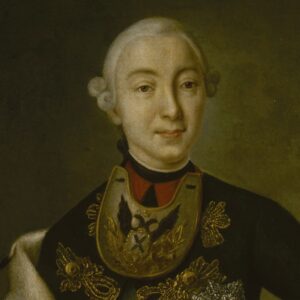
Soon after this the young Duke set out on his journey. On February 16, 1742, the future emperor arrived in St. Petersburg. The meeting was accompanied by great celebration. At the end of winter, Peter III attended the coronation of Elizabeth. After officially gaining power, the ruler granted her nephew the rank of lieutenant colonel of the Preobrazhensk Guard. When betting on the grandson of Peter I, Elizabeth did not take into account his lack of education. The young Duke surprised the Empress with his ignorance and sickly appearance. Intending to raise a successor, she began searching for a worthy teacher. In the end, the choice fell on academician Jacob von Stehlin, who was distinguished by his extraordinary intelligence.
Among other things, Staehlin was a skilled mentor. Peter’s training began cautiously. To awaken interest in science, the academician talked about what attracted the student the most. And then he casually gave useful information on other subjects. The student was not easy. Most of all, he was attracted to everything related to military affairs. Therefore, the young man willingly studied mathematics, especially in those areas where it came into contact with engineering and military issues. In other subjects, Peter III did not see anything interesting; he listened to the teacher absent-mindedly and reluctantly.
Among other things, the future emperor was taught dancing. A teacher from France was assigned to the young man. The successor considered the classes as sheer torment. Elizaveta Petrovna was a skilled dancer and demanded the same from others. But the young Duke did not share this hobby. He hated exercising, but there was nothing to do. To encourage his careless student to study, after each lesson, Stehlin kept notes on what he had learned, and also left notes on the behavior and mood of the young Duke. The academician referred to the fact that Elizaveta Petrovna personally supervises the training. Control from a strict aunt forced Peter to pay more attention to his studies. The future emperor was taught the Law of God and the Russian language. His mentor in these sciences was Simon Todorsky. In November 1742, the young man was baptized in the Orthodox faith. Since then he bore the name Pyotr Fedorovich.
The ceremony was prepared in great haste. The whole process of baptizing a young man became a political move. Shortly before this, the King of Sweden died. Peter III, as a close relative of the monarch through the male line, had the right to the throne. Elizabeth and her retinue sought to make the Duke the successor to the Russian throne as soon as possible. And so it happened. When Swedish ambassadors arrived in the country in December, it turned out that the heir had changed his faith. In 1743, Elizaveta Petrovna’s nephew began to comprehend science more thoroughly. Over the course of several years, he began to understand the disciplines taught. However, as time has shown, he was not at all interested in Russian history, traditions, or the way of life of the people. To the core, Peter was a foreigner who despised both people and the country itself. After the start of the Seven Years’ War, Peter III began to openly criticize Elizabeth Petrovna and her government. He idolized Russia’s enemy in the person of the Prussian king Frederick II.
The inappropriate, ridiculous behavior of the future ruler, contemptuous attitude towards Russia and its people made Peter an extremely unpopular character. Both among high society, the ruling elite, the court, and among ordinary people.
ACCESSION TO THE THRONE:
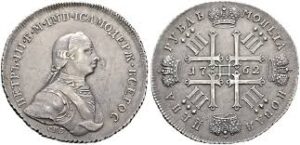
On January 5, 1762, Elizaveta Petrovna died. Peter III became the new sovereign. The old approach to assessing his personality paid attention only to the emperor’s vices. He was presented as a weak-minded person unfit for political activity. This approach spread at the instigation of the organizers of the coup: Catherine the Great and her associate, Princess Dashkova. In reality, everything was much more complicated. The emperor had a complex, contradictory character. Despite his rather strange disposition, he strove to fulfill his duties conscientiously.
DOMESTIC POLICY:
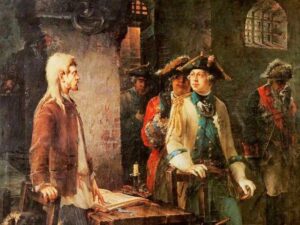
Oddly enough, Emperor Peter Fedorovich Romanov did not have a clear program of action. Many of the implemented projects were prepared during the time of Elizabeth. The newly-made ruler became the conductor of ready-made plans. Although there were exceptions. Among the most significant decisions of the young emperor were: Publication of the manifesto on noble liberty on February 18, 1862. Through the efforts of the new sovereign, the ruling class received even more privileges, the main of which was the opportunity not to serve (under Peter, this condition was mandatory for all nobles). Redistribution of land property. During the same period, the emperor decided to secularize church lands. That is, about the seizure of plots that belonged to a religious organization in favor of the state. But this decision was postponed for several years. Maintaining and developing the economy. In March 1962, a decree on freedom of foreign trade was issued. And already in May the government organized the State Bank. Refusal to persecute Old Believers, which was a step towards religious tolerance and freedom of conscience. At the same time, the reign of Peter III was marked by a significant strengthening of serfdom. The peasants became even more helpless than they were before. Landowners gained more and more rights over their farmers. The emperor, according to the memoirs of his contemporaries, was an active, active, but eccentric man. He viewed the political life of the country more like a game, dealing with affairs in passing. Despite some useful actions, Peter III was never able to gain support. He failed to find support either in the ruling class, much less among the peasantry, the common people. In many ways, this was the reason for such an easy overthrow of the current ruler.
FOREIGN POLICY:

The years of the reign of Peter III (or, more precisely, months, since he was in power from December 5 to July 9, 1762) were marked by a catastrophe on the international stage. The emperor was a frivolous man. He did not know how to think strategically at all, and was biased.
In March, at the insistence of Peter III, Russia signed a truce with Prussia. And already in May she concluded an alliance, withdrew from the Seven Years’ War and gave up all the conquered territories without any claims for exchange. Moreover, the country began to prepare for war with Sweden for Prussian interests. Russia itself did not benefit from the conflict. The emperor was trying to annoy the enemies of his idol, Frederick II, which threatened a new political catastrophe. Only through the efforts of diplomats and the court was it possible to dissuade the irrepressible monarch from rash steps. If society accepted the reforms of Peter 3 with bewilderment, but without much aggression, an illiterate foreign policy turned everyone against him, becoming the last straw in the cup of patience.
PERSONAL LIFE:

Peter III was married to Sophia Frederika Augusta, who went down in history as Catherine II . The couple’s married life was unhappy. The wife despised her husband, who was distinguished by strange interests and rather immature behavior. The husband himself answered in the same coin when he spoke insultingly about his legal wife. They became parents late. According to a number of researchers, the reason for this was a disease that prevented Peter III from conceiving a child. The only surviving descendant of the couple was Paul I. Daughter Anna died in infancy. The husband often doubted his paternity, which was not surprising. Both the emperor himself and his wife were married only legally. Their rare meetings can only be called family life with a stretch. Peter had a lot of mistresses. He had the greatest weakness for his favorite Elizaveta Vorontsova. Catherine did not lag behind her unfaithful husband and could boast of a whole crowd of lovers.
OVERTHROW AND DEATH OF THE EMPEROR:

Shortly before his death, Peter III again quarreled with his wife, insulting Catherine in front of a huge number of foreign officials. This was the last straw. Soon information reached the sovereign that a conspiracy was being prepared against him. However, he only waved it off. In the summer, the wife, with the support of the Orlov brothers, began to act. The Guard went over to the side of the rebels. The news of the betrayal of the military came as a real shock to the sovereign. He lost the will to fight and, contrary to the advice of the court, abdicated the throne. By order of the wife of the deposed emperor, they were taken into custody. Peter 3 died on July 17, 1762, according to the official version – from hemorrhoidal colic, which was the result of heavy drinking.
Most historians agree that the emperor was killed by the brother of Catherine II’s favorite Orlov. The rebels did not need a living legitimate ruler. After the death of the sovereign, the wife of Peter 3 personally ascended the throne. The ruler was rehabilitated only later. The son of Peter and Catherine, Paul I, who despised his mother, had a hand in this. After a series of movements, the remains of the ruler were buried in the Peter and Paul Fortress.
RESULTS OF ACTIVITIES:
As history has shown, the Duke of Holstein was not fit for government. The biography of Peter 3 was full of difficulties and trials. A difficult childhood, as well as inept upbringing, morally crippled the young man. The unbalanced character also affected the policy of the sovereign during the years of his direct reign. In general, Peter followed the course of his famous grandfather and late aunt Elizabeth. However, the lack of competent planning has sowed uncertainty about the future in the hearts of the people. The attack on the rights of serfs turned the peasants against Peter. Attempts to take away the land – the church. Inept contradictory politics – the nobility. The army was not happy either. The ruler had absolutely no respect for either soldiers or officers, trying to reshape the structure of the troops and impose Prussian order in the ranks. For the internal life of the country in global terms, nothing changed during the six months of Peter’s reign. The international scene was a completely different matter. The last straw that broke the cup of patience was an illiterate and frankly destructive foreign policy. Peter III became a hated figure. It was thanks to this, as well as the lack of will and unwillingness of the sovereign to resist, that the conspirators achieved easy success.
